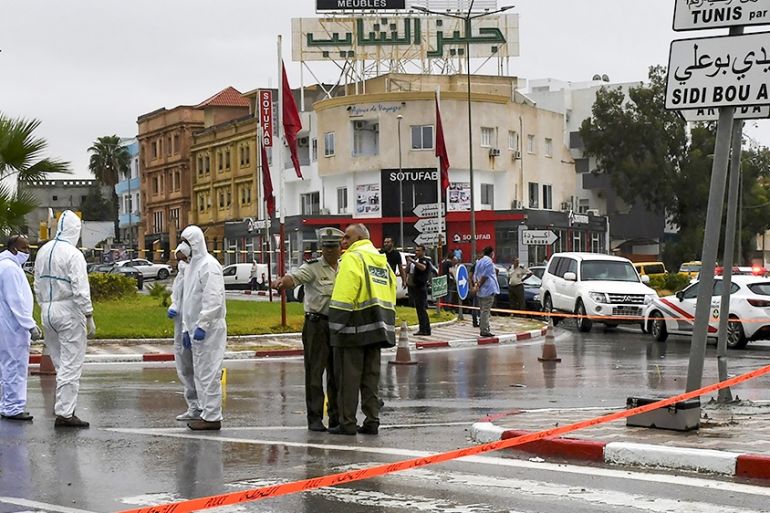Officer, three assailants killed in Tunisian resort attack
The attack took place in the coastal resort town of Sousse, where a gunman killed 38 people in 2015.

Tunisian forces shot dead three assailants who rammed their vehicle into security officers and attacked them with knives, killing one officer and injuring another in the coastal resort town of Sousse.
Sousse was the site of Tunisia’s deadliest attack in 2015 when a gunman killed 38 people, most of them British tourists.
A patrol of two National Guard officers was targeted in the knife attack on Sunday in Sousse, 140km (87 miles) south of the capital Tunis, said National Guard spokesman Houcem Eddine Jebabli.
“One died as a martyr and the other was wounded and is hospitalised,” he said, adding “this was a terrorist attack.”
The attackers first rammed the gendarmes with a vehicle at about 6:40am (05:40 GMT).
After the knife attack, security forces pursued the assailants who took the officers’ guns and vehicle through the Akouda district of the city’s tourist area of El-Kantaoui, said Jebabli.
“In a firefight, three terrorists were killed,” he said, adding security forces “managed to recover” the car and two pistols the assailants had stolen.
The North African nation’s prime minister, Hicham Mechichi, appeared to suggest the assailants’ planning might have been faulty.
Speaking in Sousse at the site of the attack, he announced the arrest of a fourth suspect who had been on board the vehicle that rammed the National Guard officers.
“These terrorist groups wanted to signal their presence,” he said. “But they got the wrong address this time. The clearest proof of that is that the authors of this attack were eliminated in a few minutes.”
Tunisian President Kais Saied, on a visit hours later to the sealed-off scene of the knife attack, said police were investigating whether it was planned “by individuals or an organisation”.
Struggling to rebound
The previous attack in Sousse on June 26, 2015, dealt a heavy blow to Tunisia’s tourism sector, a pillar of its economy.
The ISIL (ISIS) armed group had claimed responsibility for that attack.
|
|
Aymen Rezgui, a Tunisian student who trained with Libyan fighters, walked onto the beach of the Imperial Hotel and used an assault rifle to shoot at tourists in lounge chairs. He then continued onto the hotel pool before throwing a grenade into the hotel. He was later killed by police.
The year 2015 was a particularly bloody one with three deadly attacks claimed by ISIL. An assault at the capital’s Bardo National Museum in March 2015 had killed 21 foreign tourists and a security guard. In November that year, a bus bombing in central Tunis had killed 12 presidential guards.
While the situation has significantly improved since then, Tunisia has maintained a state of emergency.
Assaults on security forces have persisted, mainly in remote areas along the border with Algeria.
Last week, Tunisia’s parliament approved a new technocratic government led by Mechichi, which faces the task of tackling deep social and economic woes in the North African country.
The 46-year-old premier pledged to revitalise the economy, including the crucial tourism sector, which had rebounded after the attacks but has been hit hard this year by the coronavirus pandemic.